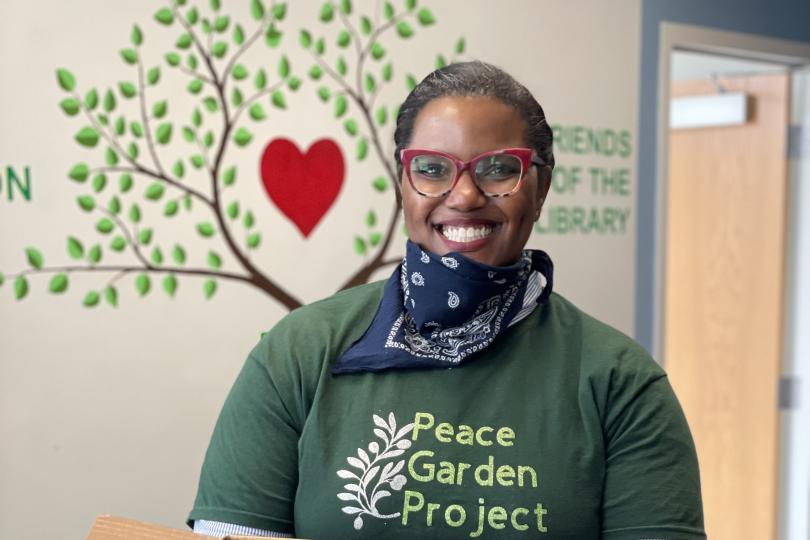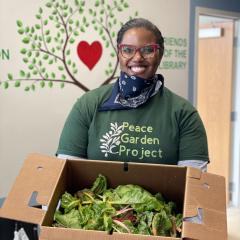Michelle Lewis: sowing seeds for justice, from church gardens to the campaign trail
Senate Candidate. Seamstress. Park Ranger. Gardener. Activist. Filmmaker. Law Enforcement Officer. Reverend. Switzer Fellow Michelle Estelle Lewis ties together these seemingly disparate identities with the threads of faith, justice and environmental stewardship.
Ranger roots lead to studying religion and environment
Michelle’s career began working for the National Park Service as a teenager, serving as an education and interpretation ranger throughout college. She was recruited for management upon graduation. “They called and offered me the spot,” she recalls, “and then they said ‘but we're really only taking people who are willing to go into law enforcement.’"
It was a big change from environmental education, but 23-year-old Michelle decided to go for it. “I’m really glad I did because it forced me outside my comfort zone,” she says. “As a park officer, I was out hiking in the woods by myself. I'm from an island where there aren't a lot of woods and if you’re there, you're not in them by yourself. So it really did force me to experience the environment in a different way. And I noticed that I didn't see a lot of people who look like me in the outdoors.” This observation got her thinking about how underserved communities connect with the environment.
A serendipitous meeting at her last duty station, the Martin Luther King Jr. National Historical Site, pointed Michelle in further in that direction. While working a major celebration with over 5000 people on the street, Michelle remembers, “I just spoke to the person standing closest to me and it was this person from the Yale School of the Environment.” He encouraged her to apply. She was accepted, and Yale’s joint Degree in Religion & Ecology allowed her to focus on environment and faith simultaneously. “Religion had been in the back of my mind, because it is very much a part of my personal life story,” Michelle says. She became the first Black woman to complete the program.
Michelle’s research focused on connecting underserved populations to the environment through their existing faith systems. She asked: what do faith systems say about an environmental ethic or land stewardship? How do we help people engage with concepts of environmentalism in a way that honors their faith systems? While exploring these questions, Michelle was also struggling to pay her bills as a graduate student.
Students sow seeds to stop food insecurity
“I was a broke graduate student, just like trying to make it,” Michelle says. “I'd left a government job to go back to school. I had rented my house out to people who decided they were going to stop paying rent, so I was paying an attorney. My life was just crazy.”
She decided to go to social services to see if she could get some help. Michelle recalls that the caseworker told her she made too much to qualify, and even if she worked less, she’d only receive about $20 a month. Then she suggested that Michelle have a baby and listed all the benefits she would qualify for with a child. Michelle left feeling defeated. Luckily, she was able to ask her parents for support, which they provided. “I had a safety net. But it got me thinking about all those people that don't have safety nets that just need a little bit of help, but they don’t get any help.”
When she realized some students she worked with were food insecure, she had an idea. “I thought, well, we could probably get some seeds, I could teach them how to grow food and maybe teach myself in the process. Thankfully, it worked!” They started gardening and Michelle started thinking: how could communities of faith get on board with this work?
That seed ultimately grew into Michelle’s nonprofit, the Peace Garden Project. Working at the intersection of food justice and faith, the organization helps congregations to create gardens. Gardens allow congregations to enact their values of service by feeding the hungry and teaching those who can to grow their own food. The group also uses gardens to educate around the isms and phobias that stop communities from getting to know their neighbors and pose barriers to justice.
Campaigning to change the system
Throughout her ministry, Michelle has advocated for people who have had their rights violated by police. She witnessed poor treatment of people by police as a park officer and as a community member after returning to North Carolina. Michelle’s grandmother lived just around the corner from where Andrew Brown was killed by police in Elizabeth City.
“I had encountered him and some of his kids, but didn't really know him,” she says. “I was wowed as I began to learn about what was going on and to really be honest about some of the corruption that was in the police departments in this community.”
Michelle helped organize protests and was part of meetings with the North Carolina Governor and Attorney General. “They said that they couldn’t do anything, but we needed to vote. It turned into politicians campaigning in a room full of people who were grieving and traumatized,” she recalls. “Finally I said: respectfully, Mr. Attorney General, you’re speaking to a room full of people who do vote. Many of whom voted for you all. For you to now say you can’t do anything - you’re the head of oversight for police in our state.”
Michelle and fellow organizers began to see the issue not as voting, but as running for office. She says, “you can vote all day long, but if you don't have people in office, who are actually really concerned, or who will really care about the issues that you have as people, it doesn't matter.” They recruited several candidates to run for office in the 2022 elections, including Michelle Lewis as a certified unaffiliated write-in candidate for United States Senate.
Throughout her campaign, Michelle traveled all over North Carolina. “I've learned more in the last year, probably than I have in the last decade” she says. “It forced me to go into places that I wouldn't have gone into and forced me to have conversations with people whom I might not have talked to. It was really a growth experience.” She had profound and challenging conversations with people on the campaign trail, from heartfelt tears at being heard, to anger and dismissal. “I tried to really dig in on those conversations.” she says. “In all those places, I talked about the environment. I talked about police reform to anyone who would listen.”
Michelle remembers one conversation where a man said he voted for both Barack Obama and Donald Trump. When Michelle asked why, he responded, “both times, I voted for what I thought would be change.” This was a message she heard over and over again, “far more than I would have imagined was even real,” she says. “But that’s not the narrative you hear when you turn on the television. When we begin to treat people like there's only one possibility for them in their lives, we're doing all of us a huge disservice.”
Being nonpartisan posed unique challenges. Michelle had to collect petition signatures in order to be certified as a write-in candidate. When she would bring signatures to county election boards, she then often had to train officials on how to process them. When she was certified, the state and some nonpartisan voter education groups refused to list her with other candidates in their voter education.
Michelle did not win, but she sees the campaign as part of a long-term effort to change the party system. She believes unaffiliated candidates would have a chance in North Carolina if there was a system in place to train candidates and share information with voters. “People are truly fed up with the system as it is,” she says. “When you look at the number of people who didn't vote because they felt like there wasn't a candidate that represented them, part of that is because they didn't have all the information on all the candidates.”
An evolving personal environmental ethic
Michelle sees herself running for office again someday. She plans to train future nonpartisan candidates on what they need to do to run for office and will continue to work on food justice. She is also working on a film about the use of water across faith traditions and even launching a custom clothing line this spring. The clothing line came about because Michelle developed an allergy to the blue dye in synthetic fabric while campaigning. “Fast fashion is bad for all of us. It’s bad for the environment, it’s bad for our bodies. I didn’t realize how toxic it was until I developed an allergy” she says.
Michelle sees all of these things as an extension of an evolving personal environmental ethic to be a good steward, which was bolstered by becoming a Switzer Fellow in 2010. The Switzer Fellowship helped reinforce Michelle’s commitment to the environment at the intersection of religion and faith and has kept her on this path ever since. In graduate school, Michelle was at the forefront of the conversation connecting religion and the environment. “At the time I wondered, am I crazy? The fellowship showed me, no you’re not crazy, you’re actually on to something.”
The Switzer Network has also helped Michelle maintain her connection to the environment throughout the turns of her career. “Even when I was more steeped in religion than in the environment, the network continually helped me refocus and remember that this environmental work has always been really important to me, and why it’s important.”

